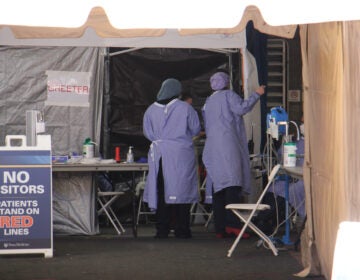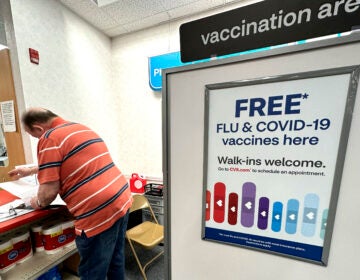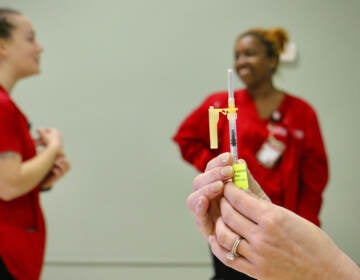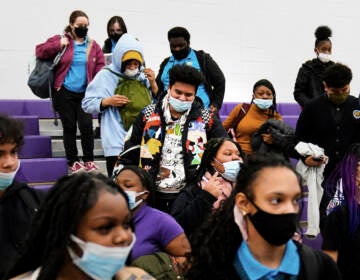Coronavirus update: Murphy prohibits internet and phone shutoffs
Internet and phone service cannot be shut off to customers until 30 days after the current public health emergency has ended.

A nurse dons protective equipment with the assistance of colleagues at Holy Name Medical Center in Teaneck, New Jersey, March 19, 2020. (Jeff Rhode/Holy Name Medical Center)
Updated: 5:40 p.m.
Are you on the front lines of the coronavirus? Help us report on the pandemic.
New Jersey officials reported another 3,219 cases of coronavirus cases on Monday, with the state’s total now at 64,584.
Gov. Phil Murphy also said another 94 people have died, bringing the state’s total number of fatalities to 2,443.
“To put that in perspective, that is more than the number of New Jerseyans who gave their lives in the combination of the Korean and Vietnam wars,” Murphy said.
Governors launch working group on reopening the economy
The governors of New Jersey, Pennsylvania, Delaware, New York, Connecticut and Rhode Island announced Monday they were creating a joint working group to study how to reopen the regional economy once the coronavirus pandemic is under control.
The six Democrats made the announcement on a conference call with reporters just a few hours after President Trump, a Republican, said on Twitter “it is the decision of the president” when to send Americans back to work and reopen businesses.
….It is the decision of the President, and for many good reasons. With that being said, the Administration and I are working closely with the Governors, and this will continue. A decision by me, in conjunction with the Governors and input from others, will be made shortly!
— Donald J. Trump (@realDonaldTrump) April 13, 2020
“Seeing as we had the responsibility for closing the state down,” said Pennsylvania Gov. Tom Wolf, “I think we probably have the primary responsibility for opening it back up.”
Later Monday, the Republican governor of Massachusetts, Charlie Baker, announced his state would also participate.
New York Gov. Andrew Cuomo said the working group will consist of a public health official and an economic development official from each state, as well as each governor’s chief of staff.
The governors stressed that they would proceed cautiously with any loosening of social distancing mandates and did not provide a timeline for when that would begin.
“An economic recovery only occurs on the back of a complete health care recovery, and that order is essential,” New Jersey Gov. Phil Murphy said. “Getting that wrong, transposing those steps or jumping in too early, or maybe jumping in by ourselves … you could have inadvertent, unintended consequences, which could be grave.”
Cuomo also said that approaches may vary state-by-state but that regional coordination is still merited given how people and goods — and therefore the virus — move between the states.
Rutgers-created saliva test could be game changer
A new coronavirus test that uses a person’s saliva — as opposed to samples collected through nose and throat swabs — has been approved for use by the federal government.
Developed by researchers at Rutgers University and other partners, the new method could greatly expand the availability of tests and help health care workers avoid some risky patient interactions.
“Saliva testing will help with the global shortage of swabs for sampling and increase testing of patients, and it will not require health care professionals to be put at risk to collect samples,” said Andrew Brooks, chief operating officer of Rutgers’ RUCDR Infinite Biologics, which helped create the test.
“Saliva testing will also be important for people who are in quarantine because they don’t know how long it will be until they are no longer infectious,” Brooker said. “This will allow health care workers to release themselves from quarantine and safely come back to work.”
RUCDR Infinite Biologics — a cell and DNA repository that is part of Rutgers’ Human Genetics Institute of New Jersey — developed the test with Salt Lake City-based Spectrum Solutions and Accurate Diagnostic Labs.
It’s actually a modification of an existing test from another company, but it’s the first saliva-based test to gain federal approval.
Rutgers said in a news release that the tests are currently available at hospitals and county health departments that are part of the RWJBarnabas Health network.
The test will also be available to residents of Middlesex County starting Wednesday at the county’s existing drive-thru testing site at 33 Kilmer Road in Edison.
Murphy suspends phone, internet shutoffs
As he has already done for utility service and insurance coverage, Murphy on Monday prohibited internet and phone service from being shut off to customers until 30 days after the current public health emergency has ended.
The governor also banned service downgrades or late fees due to nonpayment and required companies to restore service to anyone who has had their phone or internet disconnected due to nonpayment since March 16.
“I’m doing this for a simple reason: people actually need to stay connected,” he said, such as school children learning from home and families arranging for medical care. “This is no time for anyone to have their connection to the world severed.”
Murphy said most telecom providers in the state had already complied voluntarily with that policy but the few that hadn’t would now be forced to “get with the program.”
Booker bill would release more immigrant detainees
U.S. Sen. Cory Booker of New Jersey is among the lawmakers sponsoring new legislation that would likely force U.S. Immigration and Customs Enforcement to release many more immigrant detainees during the coronavirus pandemic.
According to ICE data, 16 of the 72 immigrant detainees who have tested positive nationally are or were located at detention centers in New Jersey, the most of any state.
“Immigrants who are currently being held in detention centers in the United States are actually at higher risk of contracting COVID-19 because of the conditions that they are living in, and they put others at risk who deal with them on a daily basis,” Booker said Monday on a conference call with reporters.
Booker’s point echoed warnings from the U.S. Department of Homeland Security’s own medical experts, who said last month that an outbreak at an immigrant detention center could cause a “tinderbox scenario” where the virus spreads into the larger community via the people who work there.
The solution, the experts said, was to remove as many people as possible from “high risk congregate settings” — the same logic that has been used to justify the release of people from jails and prisons across the country, including in New Jersey.
ICE has already moved in this direction, having directed its field offices to reassess custody of anyone older than 60 and those with chronic illnesses that may compromise their immune system.
The agency has released 160 detainees and identified as many as 600 more determined to be especially vulnerable, ABC News reported Saturday.
But Booker and other federal lawmakers want a larger portion of the estimated 37,000 immigrants in ICE custody released.
Their bill, called the Federal Immigrant Release for Safety and Security Together (FIRST) Act, requires ICE to release detainees who are older than 50, younger than 21 or have certain health conditions unless they can be shown to pose a threat to public safety.
The bill would also guarantee detainees access to basic communications technology and hygiene products.
The measure faces uncertain prospects for passage under President Trump, who espouses hardline views on immigration. Booker said he hopes the bill could be attached to a larger package of legislation.
WHYY is your source for fact-based, in-depth journalism and information. As a nonprofit organization, we rely on financial support from readers like you. Please give today.



![CoronavirusPandemic_1024x512[1]](https://whyy.org/wp-content/uploads/2020/03/CoronavirusPandemic_1024x5121-300x150.jpg)



